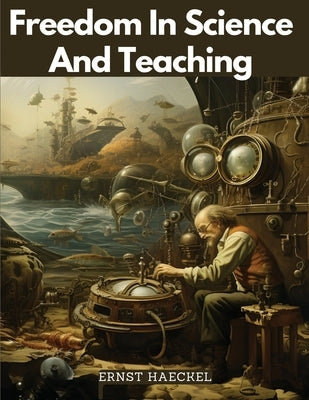Before you leave...
Take 20% off your first order
20% off
Enter the code below at checkout to get 20% off your first order
Discover summer reading lists for all ages & interests!
Find Your Next Read

"Freedom in Science and Teaching" (German: "Die Freiheit der Wissenschaft im modernen Staat") is a book written by Ernst Haeckel, a prominent German biologist, naturalist, and philosopher.
Originally published in 1877, the book presents Haeckel's views on the relationship between science, education, and the state. Haeckel was a key figure in the development of evolutionary biology, and his works had a significant influence on the field.
Key aspects of "Freedom in Science and Teaching" include:
Scientific Freedom: The book is a passionate defense of scientific freedom. Haeckel argues that scientists must have the freedom to pursue their research and share their findings without undue interference from religious or political authorities.
Evolution and Darwinism: Haeckel was an early proponent of Charles Darwin's theory of evolution, and he believed that the teaching of evolution was essential for the progress of science and human understanding. He discusses the importance of teaching evolutionary theory in schools and universities.
Separation of Church and State: Haeckel advocates for a clear separation of church and state, asserting that religious dogma should not impede scientific progress or the education of future generations.
Educational Reforms: The book calls for educational reforms that promote critical thinking, the scientific method, and the dissemination of knowledge. Haeckel believed that science should be at the forefront of education.
Controversy: "Freedom in Science and Teaching" was highly controversial when it was published, as it challenged the religious and conservative establishment of the time. Haeckel's views on evolution and the relationship between science and religion sparked debates and legal challenges.
Influence: Ernst Haeckel was a prominent advocate for Darwinism and made substantial contributions to the fields of biology, zoology, and evolutionary theory. His work and advocacy played a role in the wider acceptance of evolutionary ideas in Germany and beyond.
"Freedom in Science and Teaching" remains a significant historical document in the context of the tension between science and religion in the late 19th century. Haeckel's book, along with his broader scientific and philosophical contributions, has left a lasting impact on the field of biology and the ongoing discussion of the role of science in education and society.
Thanks for subscribing!
This email has been registered!
Take 20% off your first order
Enter the code below at checkout to get 20% off your first order